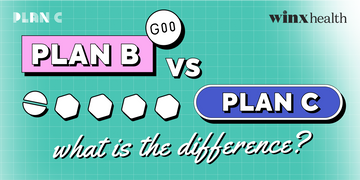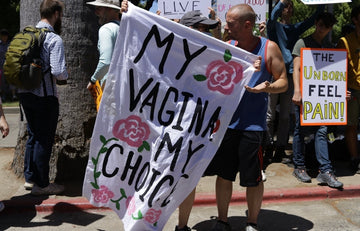What is the difference between the abortion pill and the morning-after pill?

Plan B, emergency contraception, birth control, the morning-after pill, the abortion pill… You might be thinking to yourself, “wtf are all these pills and when should I take them?” If you’re feeling a bit confused, you’re not alone. 73% of US adults confuse the use of Plan B with the use of Plan C. First, let’s define each of these pills and what they actually do.
Birth control pills
Birth control pills are a hormonal pill you take every day to prevent pregnancy. There are two main types: combination pills (which have both estrogen and progestin) and progestin-only pills (often called mini-pills). When you take them exactly as you’re supposed to, birth control pills are over 99% effective, but with average use, they’re closer to 91% effective. Birth control pills are generally prescribed by your doctor, but this year the US launched an over-the-counter pill, Opill. You can buy Opill at your local pharmacy!
Birth control pills are used by women of all ages, for a number of reasons. Beyond pregnancy prevention, birth control can regulate menstrual cycles and alleviate cramps, reduce symptoms related to conditions like endometriosis and PCOS, help with acne, and so much more.
We often view birth control as a run of the mill medication, but the broader impact it has had on women’s lives is important to understand. Since the FDA first approved the birth control pill in 1960, it’s offered women more ownership over their bodies, and in turn, futures. The ability to plan when and if you want kids has impacts on women’s decisions to pursue higher education, career paths, and the capacity to achieve financial independence.
The morning-after pill
The morning-after pill, Plan B pill, emergency contraception, Restart, Julie, Ella – so many names, so many brands, but they all do the same thing. The morning-after pill is most commonly referred to as Plan B, but Plan B is just a brand name for the emergency contraceptive pill!
The morning-after pill contains the active ingredient levonorgestrel, which works to delay ovulation so that there is no egg to fertilize after unprotected sex. When taken within 72 hours of unprotected sex, it reduces the likelihood of getting pregnant by 75-89%, if you have not yet ovulated. The sooner you take it after unprotected sexual activity, the more effective it is.
Most of the side effects you experience by using the morning-after pill are minor. You likely won’t experience long-term effects or changes to your general wellbeing. Nausea is one of the most common side effects of using the morning-after pill. Get in touch with your primary care provider if you vomit within a few hours of taking the morning-after pill to determine whether you need to take another dose.
You might also experience:
- Abdominal pain (cramps)
- Breast tenderness
- Headache
- Dizziness
- Fatigue
- Vomiting
Medical professionals consider the morning-after pill to be safe to use, and there are no safety concerns related to how often you can use it. Although you can use the morning-after pill multiple times without negative health consequences, it’s not recommended for use as your regular birth control method.
Access to emergency contraception can be a lifesaving tool - it helps prevent unwanted pregnancies and reduces abortion rates. Sadly, 49% of women living in a state where abortion is banned also believe that the morning-after pill is banned in their state. Currently, the morning-after pill is legal and available over the counter in all 50 states!
However– this June, The Right to Contraception Act was blocked by senate republicans for the third time in 3 years. Instead, republicans introduced their own bill that does NOT protect emergency contraception or IUDs.
The abortion pill
While most types of the morning-after pill are available over the counter, the abortion pill (Plan C) requires a prescription. And while the morning-after pill prevents pregnancy before it starts, the abortion pill ends an existing pregnancy. The process involves taking two medications- mifepristone and misoprostol. The two pills work together- mifepristone stops a developing pregnancy by blocking the hormones necessary to maintain the pregnancy. Misoprostol causes cramping and expels the existing pregnancy from your body.
The abortion pill has similar side effects to a miscarriage. You might experience fatigue, dizziness, bleeding, abdominal pain, cramps, and changes to your body temperature. It is important to know that if you start to experience more serious symptoms such as high fever, chills, nausea, or vomiting after taking this pill, you should seek medical care right away.
Both the abortion pill and surgical abortion are under attack. In 2022, the Supreme Court overturned Roe v Wade, leaving abortion laws to individual states. In the past 2 years, 21 states have either banned or severely restricted abortion, and we are already seeing devastating effects. Recently the story of Amber Thurman came out. Amber was a 28-year-old mother who died because of an abortion ban. Doctors were unable to treat her and save her life, because of restrictions put in place in her state. And she is not the only one.
The lack of knowledge and the confusion around birth control pills, the morning-after pill, and the abortion pill create chaos for those trying to understand which option they need. This goes to show us how important comprehensive sex education really is. 32 states don’t require sex-ed to to be medically accurate. Yes, you read that right. Republican governors, like Ron Desantis of Florida, are restricting sex education and even banning talks of puberty until years after it has already started. We cannot make informed decisions without the proper knowledge.
Written in partnership with Plan C. Plan C is a public health campaign and a catalyst for abortion pills by mail in the US. We provide up-to-date information on how people in the U.S. are accessing at-home abortion pill options online.
Winx Health is a sexual and vaginal health hub that offers the education, intel, and problem-solving products you need to make confident health decisions.Their cult-favorite product line includes innovative at-home test-and-treat solutions for UTIs and yeast infections, as well as sexual health essentials like pregnancy tests and morning-after pills.
Keep Reading

Why is women's healthcare political?
Sep 12

Answers to your most common questions about the morning-after pill
4/25/2023 • 2 minutes

So you took the abortion pill, now what?
6/12/23 • 5 minutes








